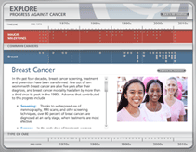Myth: Clinical trials are only for people with metastatic breast cancer.
Fact: There are many clinical trials available for individuals with stage IV, metastatic breast cancer. There are also many clinical trials available for women with stage 0 (DCIS), stage I, stage II, and stage III breast cancer. Some of these trials are studying, for example, whether a new breast cancer treatment for metastatic breast cancer can also be used in early-stage disease to prevent a recurrence. Breast cancer clinical trials also look at prevention, screening, and quality of life, including long-term consequences of cancer and its treatment
Myth: If I take part in a trial, I might be given a placebo.
Fact: Placebos are never used when a breast cancer patient would be put at risk by not having effective therapy for their cancer. Patients with metastatic breast cancer or early-stage cancer who join cancer clinical trials that are testing a new breast cancer treatment are given either the standard of care (the best treatment available for their specific cancer), or receive a new treatment that is being investigated. Only in the rare instance that there is no treatment proven to be effective against a certain type of cancer would patients be randomized to a placebo.
Myth: Any new breast cancer treatment can be studied in a clinical trial.
Fact: A new breast cancer treatment is tested in a clinical trial in humans only after there is good scientific evidence from laboratory and animal studies that the treatments are either safer or better than the current standard therapy. The first human studies (phase I trials) involve very few patients and focus primarily on safety. Only after patient safety is determined, do scientists evaluate the effects of a new breast cancer treatment in a larger numbers of patients.
Myth: My doctor — not me — should decide if a clinical trial is right for me.
Fact: Your doctor and the rest of your care team are important and can be valuable sources of information about the risks and benefits of taking part in a breast cancer clinical trial. However, your doctor may not be aware that a study investigating a new breast cancer treatment is currently taking place in your region or in other areas of the country. Also, some physicians may, for some reason, not support a certain research approach. Ultimately, the only person who can decide if a specific breast cancer clinical trial is right for you, is you.
Myth: Researchers do not treat clinical trial participants well.
Fact: A study conducted by the
Coalition of Cancer Cooperative Groups found that the vast majority of cancer survivors who had taken part in a clinical trials were very satisfied with their experience. Specifically, 92 percent said they had a positive experience, and 91 percent said they would recommend participating in a trial to a friend. Importantly, more than 90 percent of those surveyed rejected the idea that participants felt like a guinea pig or that they were subjected to more tests and procedures than were necessary. This was true for patients with metastatic breast cancer and for those with early-stage disease.
Myth: I need to live near a large cancer center to take part in a clinical trial.
Fact: Breast cancer clinical trials take place at local hospitals throughout the country. Some also take place at local cancer clinics and doctors' offices.
Myth: If I choose to enter a breast cancer trial, I have to stay in the trial, no matter what.
Fact: You are free to change your mind and stop participating in the trial at any time, for any reason.
Myth: I will have to pay for medical costs associated with my participation in a breast cancer clinical trial.
Fact: While you are in a treatment trial you may receive an experimental, new breast cancer treatment in addition to routine breast cancer care. In this instance, the trial sponsor is responsible for the new breast cancer treatment while many insurers will cover the remaining costs. In fact, many states require that insurance companies cover routine costs of care in a clinical trial. However, this varies from state-to-state, so it is important to check with your insurance carrier. Medicare has been covering routine costs for breast cancer clinical trials since June 2000.



